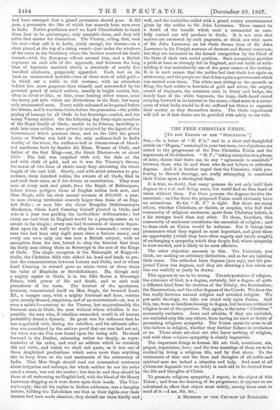THE FREE CHRISTIAN UNION. [To THE EDITOR OF THE "SPECTATOR."]
SIR,—In a letter of "H. F.'s," and in a clear and thoughtful article on " Dogma," contained in your last issue, two objections are raised to the programme of the Free Christian Union and the arguments of its defenders. "H. F.," taking exception to a phrase of mine, denies that there can be any "agreement in essentials" between those who do and those who do not believe in orthodox dogmas. And it is further urged that the Unionists, while pro- fessing to discard theology, are really attempting to construct their Union upon a theological basis.
It is true, no doubt, that many persons do not only hold their' dogmas in a real and living sense, but could find no firm bond of union without them. For these persons the dogmas involve the essentials ; and for these the proposed Union could obviously have no attractions. So far "H. F." is right. But there are many others, whether Christians, or theists, or sceptics, who feel that community of religious sentiment, apart from Christian beliefs, fa a far stronger bond than any other. To them, therefore, this community of sentiment constitutes the essentials of religion ; and to them such an Union would be welcome. For it brings into prominence what they regard as most important, and gives them an opportunity (which they have often eagerly and vainly sought) of exchanging a sympathy which they deeply feel, where sympathy is most needed, and is likely to be most effective.
The other objection amounts to this. The Unionists, you think, are making an arbitrary distinction, and so far are injuring their cause. The orthodox have dogmas (you say), and the pro- jected Union has dogmas, and they are drawing a line where no line can usefully or justly be drawn.
This appears to me to be wrong. The sole postulate of religion, the existence of God, is a dogma, certainly, but a dogma of quite a different kind from the doctrine of the Trinity, the Incarnation,. the Resurrection, and the other dogmas of the Creeds. We draw the line really between natural religion and revealed religion. We put aside theology, we take our stand only upon theism. And this, too, from no insidious leaning to dogma, but because without it religion is out of the question. Nor, again, is the term" Christian" necessarily exclusive. Jews and atheists, if they are excluded, are excluded only like any others, from having no need or desire of promoting religious sympathy. The Union opens its arms to all who believe in religion, whether they further believe in revelation or no. Those alone are shut out who know nothing of religion, and with them religious sympathy is clearly impossible.
The important things to human life are God, conscience, sin, prayer, repentance, love ; and the true meanings of these are to be realized by living a religious life, and by that alone. To the- attainment of that end the lives and thoughts of all noble and spiritual men are indeed a stimulus and help. And most of 'all (whatever dogmatic view we hold) is such aid to be derived from the life and thoughts of Christ.
To promote religious sympathy, I repeat, is the object of this Union ; and from the framing of its programme, it appears to me calculated to effect that object most widely, among those most in need of it.—I am, Sir, &c., A MEMBER OF THE CHURCH OF ENGLAND,.






























 Previous page
Previous page